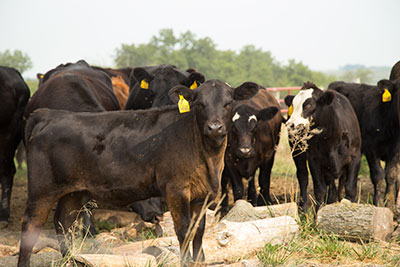Montana beef promotion hit by checkoff injunction
R-CALF USA defends checkoff injunction before appeals court, while real-world implications leave Montana beef promotion hurting.

There’s not much beef promotion, education and research going on in Montana right now due to a preliminary injunction won by the Ranchers-Cattlemen Action Legal Fund, United Stockgrowers of America (R-CALF USA). A court hearing Monday sought to make permanent the injunction as it challenged the checkoff’s government speech and First Amendment rights.
On June 21, 2017, U.S. district court Judge Brian Morris granted RCALF-USA a preliminary injunction enjoining the U.S. Department of Agriculture from continuing to allow the Montana Beef Council (MBC) to use the assessments it is qualified to collect under the beef checkoff program to fund its advertising campaigns, unless a cattle producer provides prior affirmative consent authorizing MBC to retain a portion of his or her $1-per-head assessment.
Chaley Harney, MBC executive director, said the injunction has “severely impacted” the council's budget. The national checkoff requires that $1 per head be sent to the Cattlemen’s Beef Board. Only by signing a form and tracking sales does the typically state-funneled 50 cents return to the MBC board to invest, Harney explained.
In a typical year, $800,000 would stay in Montana, but so far, MBC has received only $150,000 in checkoff dollars. In 2017, only 2,800 producers allowed their funds to go back to MBC.
Producers are still required to pay the $1-per-head assessment. However, Harney said the injunction limits the ability of the board -- made up of Montana ranchers -- to make decisions on any funding. “Their wings have been clipped. We have little to no beef promotion activity in Montana as all those funds are being sent to the Cattlemen’s Beef Board,” she said.
MBC, which is not party to the case, can’t ask producers to complete the required form but has relied on producers and other organizations to get the word out on the change. (The form is available on the council's website at www.montanabeefcouncil.org.)
On March 5, 2018, the Ninth Circuit Court of Appeals heard oral arguments from attorneys representing Agriculture Secretary Sonny Perdue and R-CALF USA in Perdue's appeal of R-CALF USA's beef checkoff program lawsuit.
Before the appellate court's three-judge panel, R-CALF USA attorney David Muraskin of Public Justice argued that the “government is wrong in claiming that the promotional and advertising messages of the Montana Beef Council is government speech, and even if it is not, then the First Amendment rights of Montana ranchers are protected by allowing ranchers to opt out of sending their money to a private corporation,” R-CALF USA said in a statement following the hearing.
In Perdue's appeal, USDA principally argued that he and his agency control the messaging and advertisements of MBC to such an extent that they cannot be construed as private speech. He contended, therefore, that the speech of MBC is government speech and not subject to First Amendment protections.
Referring to a memorandum of understanding (MOU) Purdue and MBC executed after the U.S. magistrate judge had recommended granting R-CALF USA's preliminary injunction, Muraskin argued that it should be given little weight by the court because it was created solely for purposes of R-CALF USA's litigation and is not authorized by statute or by regulation.
Muraskin further argued that case law establishes that speech can only be government speech if those who are forced to subsidize it can influence the speech through the democratic process. In this case, he said “there is no democratic accountability for the speech espoused by the private Montana Beef Council,” according to R-CALF USA.
Steve Dittmer, executive vice president of Agribusiness Freedom Foundation, countered the claims in the latest litigation, specifically noting that the board of cattle producers on MBC who run the program offer democratic accountability to the government speech.
“The dozens of grassroots beef councils around the country that are the foundation of the beef checkoff are organized in several different ways, but they are all run by cattle people, for the benefit of cattle people, using national materials developed by experts to market to today's consumer or supplemented by tools developed by state beef councils found to be useful in their state,” Dittmer said.
Harney said the 12-member board represents 11 different agricultural organizations across the state, including stockgrowers, cattle women, the farm bureau, the farmers union and meat processors. “It is a well-rounded board, and everyone is an actual rancher or producer,” she noted.
MBC was created in 1954 and is one of the oldest cattle producer boards in the U.S. Harney said there are many unknowns as this case proceeds.
“I don’t know what the future holds. It’s just the beginning of the custody battle here,” she said.
About the Author(s)
You May Also Like





